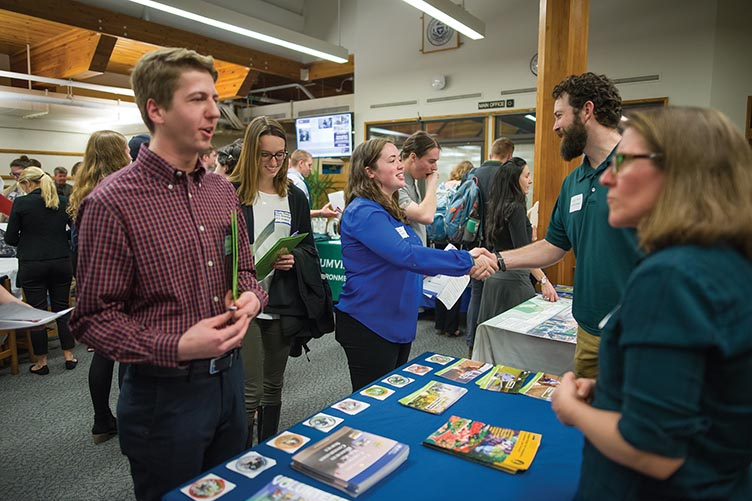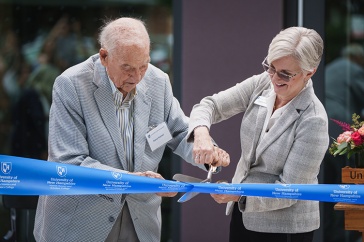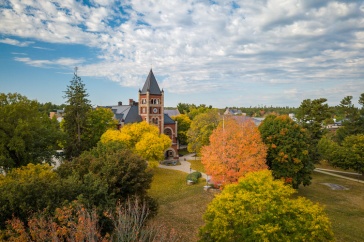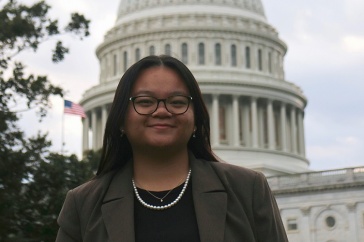
The College of Life Sciences and Agriculture (COLSA) boasts UNH’s first endowed college-based career center, the St. Martin Career Exploration Office, established with a gift from Christine St. Martin Carberry ’82. A long-time mentor to COLSA students and a member of the university’s governing board, Carberry also created the COLSA internships and Career Transitions Fund to promote the kinds of experiential learning opportunities that can broaden students’ awareness of available careers for those with a degree in the sciences. (Photo credit: Jeremy Gasowski / UNH).
UNH delivers on its mission as a flagship public research university through strong academic and co-curricular programs. These are where talent, facilities and resources come together, allowing students and faculty to understand issues and create change through education, research and its applications, and outreach.

Outstanding programs not only help students develop the knowledge, skills and experience that lead to professional and lifelong success after UNH. They also build and burnish UNH’s reputation and foster meaningful partnerships across the state as well as on a national and global stage.
It’s no surprise, then, that support for UNH programs during the campaign made up nearly 40 percent, or $115.7 million, of the $307.9 million total — second only to support for student scholarships and aid. Hundreds of UNH programs have benefitted from campaign gifts of every size directed toward them and will continue to do so. In some cases, especially significant campaign gifts have been transformational.
Coaching, Connecting and Championing Students
THE NEW FACE OF CAREER AND PROFESSIONAL SUCCESS ( CaPS )
Alyssa Ware ’18 first learned about the Nashoba Learning Group, a school for children and adults with autism, at a UNH career fair. Soon after listing it on the university’s online job portal as one of the top 10 places she wanted to work, she was invited for an interview and fell in love with the school, which is located in Bedford, Massachusetts. Now, her degree in human development and family studies in hand, she is working there full-time. Ware says the diverse classes she took at UNH and her semester-long internship at the UNH Child Study and Development Center helped push her toward her current field. She advises other students to learn about themselves and about possible careers by exploring new territory at UNH.

Ware could be channeling UNH’s Office of Career and Professional Success (CaPS). Two and a half years after re-launching what used to be UNH’s central career services unit, CaPS is wholeheartedly embracing — and advancing — its goal of establishing career and professional success as a hallmark of a UNH education.
With funding from the institution and from significant gifts made during CELEBRATE 150, the way in which UNH supports students as they prepare for life after college has been transformed from the inside out. “Our work is critical and urgent, as the future of our students has never been so uncertain,” says Trudy Van Zee, who became CaPS’ associate vice provost in January 2017.
The transformation began in 2015 with an in-depth assessment of career services at UNH. The university established a CaPS advisory board, filled new leadership positions (including Van Zee’s) and built up a team of 24 experienced professionals who brought specialized focus in employer relations, internship opportunities and student outreach — and vastly improved the organization’s counselor-student ratio. A gift from UNH Foundation board member Karen Johnson ’84 and husband Jim Broderick and a grant from UNH advancement provided critical support for the transition to CaPs, and a $2.5 million gift from the estate of longtime university librarian Robert Morin ’64 funded the much-needed renovation of Hood House, which now houses the CaPS central office, classrooms, meeting spaces and interview rooms. Funding for broadcast video and other technology to support virtual interviews, online networking and streaming content, which allows CaPS to reach a much larger audience, was provided by a technology grant from the Fidelity Foundation.

From this central location, CaPS organizes university-wide career and internship fairs, resume days, campus recruiting and other events, and makes a wide range of resources available to students. In addition to the central office, there are college- specific career centers, where teams work with students and employers on industry- and major-specific opportunities and resources, and with faculty and staff to integrate CaPS into the life of each college. “We believe in partnerships, in working across campus to get everyone behind our mission and for them to play a role in the career preparedness of our students,” says Van Zee. CaPS teams offer one-on-one counseling sessions and organize classroom presentations, industry symposiums, career competency workshops, alumni panels and more. There’s also an employer relations team, headed by Raina Sarvaiya, focused on outreach to potential employers, using customized tools to connect specific students to specific companies.
Deborah Kinghorn, a theatre and dance professor in the College of Liberal Arts who spearheads the college’s new theatre-style interview preparedness workshop, says the old model — students dropping in at the career counseling office to work on a resume — doesn’t work. “This one is for the 21st century,” she says. “With faculty, alumni and CaPS — and companies that really want our students — students are surrounded by a team and supported by it. They feel it and they like it.”

From Institute to School
CARSEY SCHOOL EXPANDS UNH’S PUBLIC POLICY FOOTPRINT
“The mission of public policy isn’t just about the mechanics of government budgets, paved streets and public education,” explains Michael Ettlinger, founding director of the Carsey School of Public Policy at UNH. “It’s about the value of making society stronger and people’s lives better.”
The same desire to create positive change in society inspired Emmy-Award winning television producer Marcy Peterson Carsey ’66 to make generous gifts that established an eponymous public policy institute at UNH in 2004 and expanded it in 2013 into a school that pursues unbiased, rigorous research and practical, real-world solutions. When she announced her $20 million gift in 2013 — the second-largest single gift in UNH history — Carsey noted that, “In the spirit of what a public research university does, investing in initiatives that take place in a school like UNH is just a wonderful community-centered and student-centered thing to do.”

Ettlinger says public policy is critically important to areas as diverse as the environment, social issues, poverty, the economy, jobs and health. It’s a broad portfolio of influence, and since transitioning from an institute, the Carsey School is producing both the research that informs public policy and the practitioners who will act on it.
Each year, the school publishes some 40 original applied research briefs and reports covering everything from Hispanic birth rates to rural poverty trends to climate change and land-use trends, and these in turn form the basis of thousands of stories in the popular media. The school also helps amplify research from other areas of UNH by bringing it to an audience outside academia. “The Carsey School punches way above its weight in terms of media,” Ettlinger says. “Becoming a school has broadened Carsey’s role at the university and allowed us to expand our areas of research and influence.”
Carsey has also expanded longstanding programs such as the Vulnerable Families Research Program; which studies how families are faring economically, with particular attention to trends in child poverty rates, social safety net usage, and making work pay; and New Hampshire Listens, a civic engagement initiative that received an American Civic Collaboration Award, a Civvy, in 2017 for its efforts to strengthen communities. Since 2014, the school’s Center for Impact Finance, which is focused on addressing U.S. income equality, has partnered with the Federal Reserve Board of Governors in Washington D.C. to convene the annual financial innovation roundtable and select one or two of its proposed projects for further development.
For Ettlinger and others, equally important as Carsey’s work conducting research and developing real-world solutions to problems is its mission to educate the next generation of policymakers who will put those solutions in place. Marcy Carsey’s 2013 gift enabled the Carsey School to absorb the master’s in community development program from the College of Liberal Arts and to add two other programs — a master’s in public administration and a master’s in public policy — that provide the academic grounding and real-world experiences that prepare students to be practitioners.

Jit Banerjee ’17G is one such student. Through the master’s in public policy program, Banerjee developed an operations consulting company, Aquinput, to help farmers in Bangladesh manage the financial transition from rice to shrimp crops. Banerjee’s idea took first place in the student track of the 2016 NH Social Venture Innovation Challenge, an idea-stage competition that is a signature program of the joint-Carsey/Paul College Center for Social Innovation and Enterprise (CSIE). He also participated in the 2017 Social Innovation Internship program, a CSIE program that places undergraduate and graduate students in summer internships at socially innovative businesses and non-profits.
Ilona Drew’s experience with Carsey’s Social Sector Franchising Initiative, an “accelerator” that connects aspiring social entrepreneurs with successful commercial franchising mentors, likewise drew a solid line between policy concepts and practice. Drew ’14, ’17G conducted field research with one of three franchises that are part of a Carsey/CSIE pilot study, Jibu, a growing network of locally owned businesses that sell “radically affordable” drinking water to underserved people living in Kenya, Rwanda and Uganda. On the ground in Uganda, Drew saw firsthand the transformation of women who had once spent their entire days procuring water but were now free to work and pursue other activities.
“Harnessing the commercial business model and using it to create good in the world is exciting,” says Bill Maddocks, a clinical faculty member at the Carsey School who directs the Social Sector Franchising Initiative. “We’re the only such center in the U.S. doing this.”
Short on Coast; Deep in Ocean Sciences
GIFTS TO UNH MARINE LABS HELP STRONG PROGRAMS
Cam Carbone ’20 is drawn to water. After injuries derailed his dreams of a Division 1 hockey career, he found himself exploring ocean engineering programs and choosing UNH’s. Someday, he’d like to be living close to the water and working with it in some way. But for now, the native of Sterling, Massachusetts, is taking a semester off to spend five weeks aboard the S.S. Healey, the U.S. Coast Guard’s largest icebreaker, to install UNH-designed sub-surface moorings under arctic ice in the Beaufort Sea. Ocean acousticians will use data from sonar mounted on the moorings to map the underside of the ice as part of the Office of Naval Research Stratified Ocean Dynamics of the Arctic initiative. At the invitation of Dale Chayes, an affiliate professor with UNH’s Center for Coastal and Ocean Mapping, Carbone spent much of his summer in the university’s Jere A. Chase Marine Laboratory building frames for mounting the sonar and conducting underwater acoustic tests in one of the lab’s tanks.

“Many of the world’s grand challenges relate to assuring availability of clean energy and water and planning for the impact of extreme events and population pressures at our shoreline,” says Diane Foster, professor of mechanical engineering and director of UNH’s ocean engineering program. “Scientists from different disciplines need to come together to work on these complex problems.” Enter ocean engineers. At UNH, they are using acoustics to locate underwater deposits of oil and gas and to map the vastly uncharted ocean floor. They are designing structures and autonomous vehicles that can withstand the wind, waves and currents of an ocean environment. They are finding ways to locate and safely recover underwater munitions left behind in military testing and training. And thanks to donor support, they have one of the world’s best facilities for advancing their work and training the next generation of ocean engineers.
A lead gift of $3 million from an anonymous donor funded the 2017 expansion of the Chase Marine Lab. According to Foster, the expansion has allowed UNH’s ocean engineering programs to grow and flourish. “We have opportunities to build and design instruments in ways we’d never realized before,” she says. “Students are more engaged in classrooms that were designed for collaboration and flipped instruction.” Four new research labs, a teaching lab and a project team space have transformed the working environment for Foster and her colleagues, too. “This is an incredibly productive research center and the new space allows us to be better at what we do,” says Foster. Researchers can process samples in the lab that they used to have to send away, for example, and they can collaborate more easily. With large, garage-style doors in each lab, it’s also easier for the public to see and understand the work that happens in Chase, which welcomes about 5,000 visitors each year.

UNH is one of few universities in the country and the only one in northern New England to offer undergraduate and graduate degrees in ocean engineering. Its program ranks among the top 10 in the nation. “Having had master’s and Ph.D. programs for more than 20 years, developing the undergraduate program allowed us to leverage a tremendous research strength for a closer connection to the broader university missions,” says Foster.
Shoals Marine Laboratory (SML) also contributes to UNH’s high profile in ocean and marine research and education and benefitted from donor support during the campaign. Located on Appledore Island off the coast of Maine and New Hampshire and jointly operated by UNH and Cornell University, it is the nation’s first and largest undergraduate marine laboratory.

J. Morgan ’84 and Tara Rutman have provided significant support for summer research internships and marine biology scholarships at SML to make these experiences more affordable for students. Their most recent gift also expanded the lab’s artist-in-residence program.
Emily Ray ’20, a marine estuarine and freshwater biology major at UNH, is a double beneficiary of the Rutmans’ generosity. The Cincinnati, Ohio, native came to UNH with a strong interest in studying shark behavior but working in professor Jim Haney’s lab opened her eyes to a different kind of marine research. Haney studies cyanobacteria in freshwater lakes. Ray received a Rutman scholarship to take a marine biology underwater research class at SML the summer after her freshman year. Last summer, Ray spent another 10 weeks at the lab as a paid aquatic ecology intern studying Crystal Lake, one of the few permanent, standing bodies of fresh water on the Isles of Shoals. Living on a field station in beautiful surroundings, being immersed in science and exposed to different projects run by researchers from all over the country were big bonuses for Ray. But her small-world moment came when her team discovered cyanobacteria in Crystal Lake. Airborne toxins from cyanobacteria blooms have been linked to health problems and disease in humans, and Ray is intrigued by how this actually happens. To find out, she’s considering medical school and a research career.
Jude Blake ’77 is helping to ensure the kinds of opportunities Ray had at SML are available to other students well into the future. In 2017, she pledged $8 million of her estate to UNH in honor of now-retired UNH president Mark W. Huddleston. A portion of the gift will support student programs at SML.
-
Written By:
Laura Chisholm | Communications and Public Affairs | Laura.Chisholm@unh.edu



















































